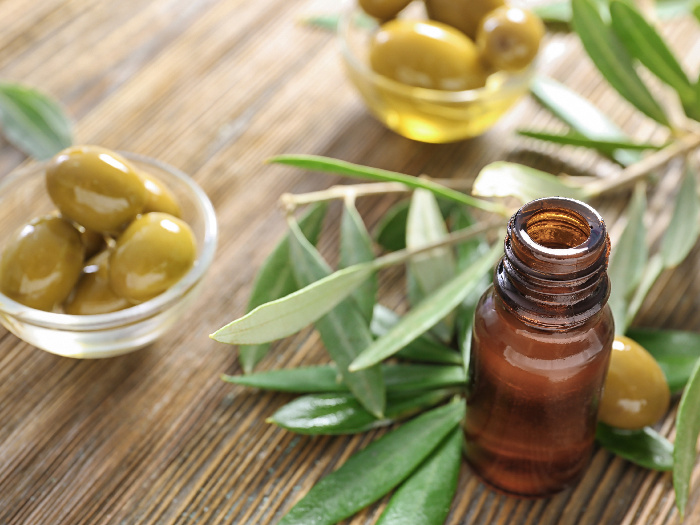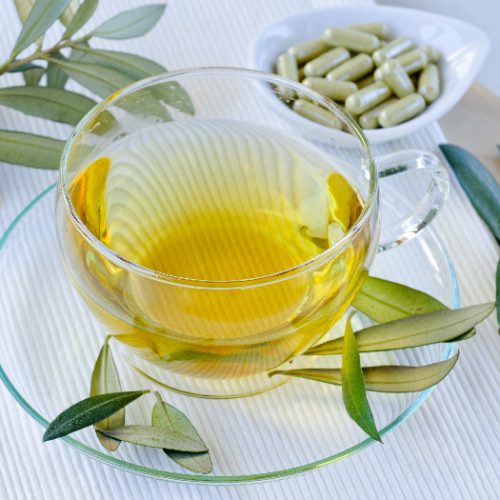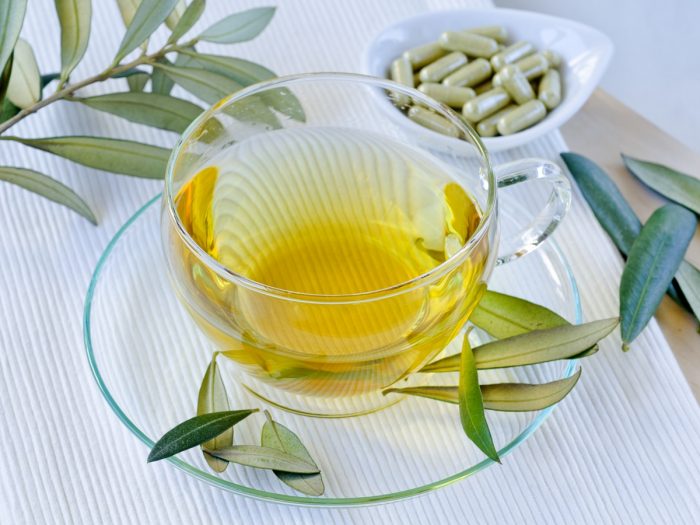While olive oil is famous around the world for the number of benefits it has to offer, the olive leaf extract is relatively less well known for its potential health effects that can make it a valuable addition to your diet. The most important health benefits of olive leaf extract may include its potential to lower blood pressure, improve cardiovascular health, regulate blood sugar fluctuation, improve cognitive function, and strengthen immunity. It may also help to lose weight, improve skin health, manage arthritis, and avoid or heal herpes breakouts.
Now, before you start using a specialized supplement such as this, it is critical to first understand the source, the potential benefits, and any possible side effects.
What is Olive Leaf Extract?
Olive leaf extract is derived from the leaves of the olive tree and has been used medicinally for thousands of years. The key ingredient in olive leaf extract (OLE) is oleuropein, along with other flavonoids and polyphenolic compounds, that deliver a host of health benefits for those who regularly consume this extract, regardless of what form it comes in. [1]
Olive trees, scientifically known as Olea europaea, are some of the oldest cultivated plants. Native to the Mediterranean region, olives have been naturalized in dozens of countries and are highly valued for the oil in its fruit. [2]
Unlike olive oil, the olive leaf extract is acquired from the leaves themselves and can be prepared at home, if you have the time and willingness. Otherwise, this extract is commonly available in supplement form. There are various other ways to benefit from the dense nutrient value of olive leaves, such as teas or tinctures, but they aren’t as efficient or potent when it comes to this extract’s health potential. You can also consume them in the form of olive leaf tea.
However, before we get started with the benefits, it is important to note that scientific research to ascertain them is limited and most of the studies available on olive leaf extract are based on animal models. Human studies are required to understand its health-promoting benefits better.
Benefits
Let’s take a look at the most important health benefits of olive leaf extract:
May Lower Blood Pressure
Research has shown that olive leaf extract may help lower blood pressure and may reduce the risk of hypertension. A 2011 study published in the Phytomedicine Journal shows how when people with stage 1 hypertension were administered with 500 mg of olive leaf extract for 8 weeks, they showed a significant reduction in their blood pressure, similar to another group of people who were given 12.5–25 mg of captopril, a blood pressure medication, twice a day, for the same duration. This goes to show that olive leaf extract has the same impact on lowering stage 1 hypertension as captopril. These effects, in turn, may help reduce strain on the cardiovascular system and lower your risk of coronary heart diseases. [3] [4]
May Have Anti-Aging Properties
The potential antioxidant abilities of this extract can help to protect the skin and protect against UVB radiation that can speed up the aging process. Additionally, the antioxidants will help soothe oxidative stress in the upper layers of the skin, which can minimize the appearance of wrinkles, age spots, and other blemishes. Regular use can also inhibit the degradation of structures in the inner layer of the skin and speed up the proliferation of skin cells [5]
May Improve Cardiovascular Health
The compounds found in olive leaf extract can prevent the oxidation of LDL or bad cholesterol that causes deposition of plaque in arteries and leads to a higher risk of coronary heart diseases. These plaques may increase the risk of atherosclerosis and other cardiovascular conditions. As evidenced in the 2015 animal study, daily supplementation of olive leaf extract may help reduce triglyceride levels, further reducing risk factors in the development of heart diseases. [6] [7]

Olive leaf extract comes from the leaves of olive plants and is distinct from olive oil. Photo Credit: Shutterstock
May Regulate Diabetes
Olive leaf extract has the potential to help reduce a person’s risk of developing type 2 diabetes. A study published in the Journal of Medicinal Food indicates how effective olive leaf extract is in starch indigestion and absorption, which further results in better regulation of blood sugar levels. If you are at high risk for diabetes or have already been diagnosed, this extract may be helpful to maintain steady blood sugar levels. [8]
May Improve Cognitive Function
Olive leaf extract offers protection against neurodegenerative diseases. Regular use of this supplement has also been prescribed for people who have suffered from other acute brain injuries, as it can reduce oxidative stress and potentially help improve cognitive performance. [9]
May Have Analgesic Qualities
If you regularly suffer from pain, the potentially analgesic qualities of olive leaf extract may help to reduce that discomfort and inhibit the signaling of nerve receptors from the site of the injury. A study published in The Saudi Dental Journal showed how a mouth rinse containing olive leaf extract helped reduce oral inflammation in patients after chemotherapy. A 2012 in-vivo animal research also shows the possible effects of olive leaf extract in reducing the swelling and resultant pain in arthritis. [10] [11]
In terms of reducing inflammation in the body, people have been taking this extract for sore joints and muscles for generations. Hydroxytyrosol, a compound found in olive leaves, “has antioxidant, anti-bacterial and anti-inflammatory properties, ” says a study published in the Journal of Ethnopharmacology. Though more studies are needed, this likely makes it an effective remedy for chronic pain of other types as well, particularly those from old injuries. [12]
May Boost Immune System
The immunomodulatory effects of olive leaf extract along with a potentially high level of antioxidants help reduce oxidative stress and relieve any strain on the immune system. A study published in the Alternative Medicine Review shows that olive leaf extract has some potential activity against the influenza virus. It shows how gargling with olive leaf tea is likely to relieve us from symptoms of a sore throat by potentially reducing the viral infection and inflammation. [13] [14]
Olive leaf extract is rich in antimicrobial properties and inhibits the growth of certain foodborne pathogens including listeria, E. coli, and salmonella. This helps give the immune a boost and protect against a variety of viral, fungal, and bacterial infections as well as foodborne pathogens. [15] [16]
May Aid in Weight Loss
A study published in the journal of Molecular Nutrition and Food Research [17] showed that subjects supplemented with olive leaf extract gained significantly less weight than those in a controlled group. A different 2016 study showed that rats given this extract had lower body weight and improved metabolic profiles. Though more studies are needed, this research indicates that olive leaf extract shows promising results in the fight against obesity. [18]
May Help Heal Herpes
Herpes is a virus causing contagious disease, most often around the mouth or on the genitals. To heal it, apply one or two drops of olive leaf extract on a cotton ball and place it on the sores. A 2016 study published in the African Journal of Microbial Research found that olive leaf extract may possess antiviral and anti-microbial properties that control the herpes virus from spreading to the nearby cells. [19]
Uses of Olive Leaf Extract
There are many uses of olive leaf extract. Let us look at them below along with their recommended dosage.
- Supplement form: The capsules tend to be 500-1000 milligrams in strength, and the recommended concentration is one with 20% oleuropein. That is the active ingredient and most important component in the extract that delivers the majority of the nutrients and health benefits. It is safe to take a supplement of olive leaf extract every day, as the body doesn’t store excess amounts of the active ingredients. [20]
- Olive leaf tea: The other way to benefit from this extract is to prepare an olive leaf tea. While fewer active ingredients will be released in the tea than that are present in the pure extract, this can still be quite beneficial for health.
How To Prepare Olive Leaf Tea?
Olive leaf tea is known for its distinct flavor and medicinal properties. You can either have it as it is or mix it with other teas and herbal infusions to create flavorful and healthy blends. Olive leaf tea benefits are quite similar to that of olive leaf extract, which includes lowering blood pressure, aiding weight loss, regulating diabetes, reducing inflammation, boosting immunity & cognitive function among other things. Let us take a look at how to make this tea in detail.

Olive Leaf Tea Recipe
Ingredients
- 8 oz water filtered
- 1 tbsp dried olive tree leaves
- 1 tsp honey/sugar/lemon juice optional
Instructions
- To make olive leaf tea, warm water in a saucepan. For any good cup of tea, water is a key component. Use filtered tap water if possible and bring it to a boil.
- Thereafter, reduce the heat as boiling the leaves for too long can burn them. Burning the leaves will not only impact the overall taste of the tea but will also reduce the antioxidant polyphenol count.
- The ideal steep time for this tea is 3-8 minutes. If you allow it to steep longer than that, the tea could turn bitter. And if you allow it to steep for less than that, it will have a mellow flavor.
- You can also bring down the bitterness of the tea by squeezing a slice of fresh lemon or adding milk, stevia, honey, sugar, and other herbal flavorings such as peppermint. Serve the tea hot!

Where to Buy OLE?
You can buy olive leaf extract from any local health store as well as on e-commerce websites such as Amazon.
Side Effects
As always, check with your doctor before significantly changing your diet, or taking olive leaf extract to treat a specific condition. Also, to prevent potential drug-nutrient interactions, check with your doctor or pharmacist if you are taking any prescription medications. There is also limited scientific data available on the possible side effects of olive leaf extracts or their long-term safety. Pregnant women too must avoid this or consult a doctor before using it. However, some of the potential side effects of olive leaf extract include:
- Allergies: The body’s immune system could overreact trying to defend itself which can potentially result in inflammatory or allergic responses such as skin rashes, upset stomach, respiratory disorders, and so on. [21]
- Stomach Issues: The powerful nature of this extract can cause stomach irritations or excessive diarrhea in some cases. This is why it is always recommended to take olive leaf extract with food. Even when you simply prepare a tincture or brew a cup of olive leaf tea, drinking extra water is a good idea. If you experience these gastrointestinal side effects, discontinue the use of the supplement and speak to your doctor.
[22] - Drug Interactions: For people who are taking medications for diabetes or hypertension, check with your doctor before adding olive leaf extract. Consult a doctor in case of kidney disorder or if taking diuretics. [23]
- Dizziness: A small number of people report dizziness or lightheadedness after taking these capsule supplements. This seems to be concentrated in people who already suffer from low blood pressure, as olive leaf extract has a hypotensive effect on the body. [24]

